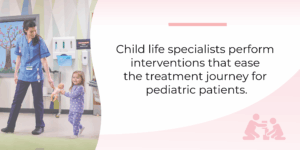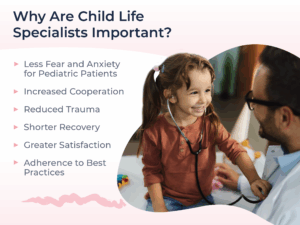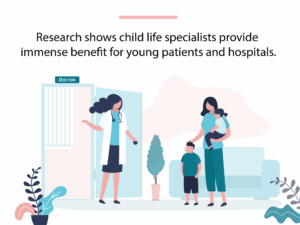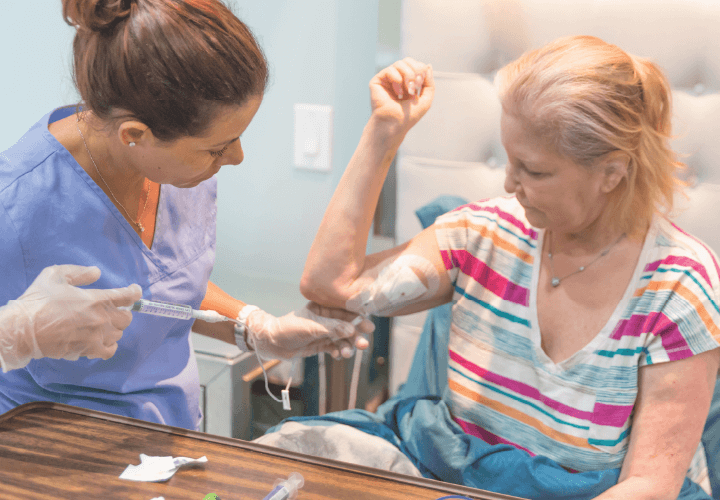- 3 MIN READ
What is a Child Life Specialist?
Child life specialists are dedicated healthcare professionals who assist children and their families in managing
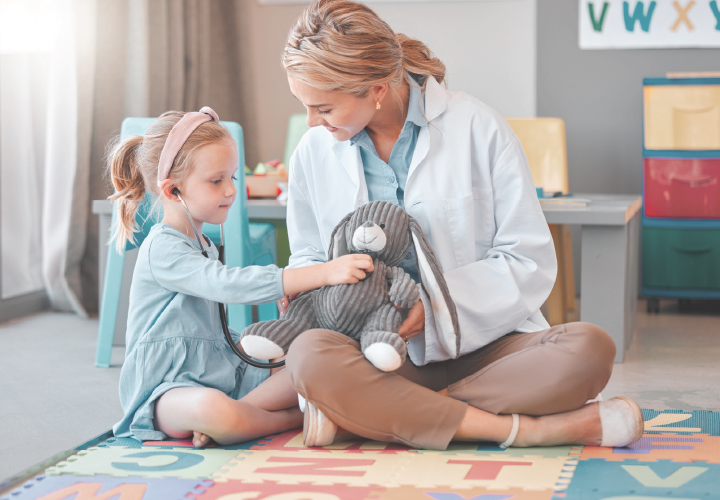
Share:
Child life specialists are dedicated healthcare professionals who assist children and their families in managing the challenges associated with illnesses, injuries, disabilities, traumas, or hospital stays. As crucial members of the caregiver team, they offer essential support and resources, enabling children and families to cope with the stress and anxiety that frequently accompany health-related issues. That’s why child life specialists serve such a vital role in pediatric care.
What Do Child Life Specialists Do?
Child life specialists are experts in child development who help infants, children, youth, and families manage the stress that comes with hospitalization. They have specialized training and must pass the Child Life Professional Certification Exam.
The child life profession began when healthcare teams recognized hospital environments were not created with kids in mind. Early child life programs were focused on educational play and recreation; the field later expanded to provide emotional care through preparation for medical procedures. This evolution aimed to minimize fear and reduce psychological trauma.
Certified child life specialists continue this critical work by being patient advocates. They ensure medical teams follow family-centered care best practices. Child life specialists also educate staff on developmental needs, push for child-friendly surroundings, and empower patients through knowledge.
What are their Duties and Responsibilities?
On a day-to-day basis, child life specialists perform interventions that ease the treatment journey for pediatric patients. Responsibilities and activities include:
- Medical Play: Using therapeutic toys like doctor kits, dolls, and plastic medical equipment to demonstrate procedures in non-threatening ways. This teaches children what to expect and empowers them through familiarity.
- Education: Explain diagnoses, tests, and treatments simply using diagrams, models, picture books, videos, and other kid-focused methods. Also, teach coping strategies like breathing techniques.
- Preparation: Guiding patients through medical procedures with step-by-step descriptions allows them to touch equipment and practice with medical play.
- Distraction: Using games, videos, music, guided imagery, or toys engages a child’s senses during unpleasant procedures to “pull focus” elsewhere.
- Legacy Building: Creating hand/foot molds, art projects, journals, or memory books help chronicle the healthcare journey, particularly for long hospital stays.
- Advocacy: Identify and request child-friendly surroundings (e.g., playgrounds), push kids to remain with parents, and educate the care staff.
- Routine Support: Organize events (birthdays, holidays), ensure homework is complete, and provide transitional support.
- Support Siblings/Family: Give age-appropriate information and support to siblings. They also train parents and caregivers on medical play, distraction, and how to coach their kids through the procedure.
- Bereavement: Providing therapeutic interventions for grieving pediatric patients and siblings surrounding death or a terminal diagnosis.
Why Are Child Life Specialists Important?
Research shows child life specialists provide immense benefit for young patients and hospitals. Utilizing their compassionate care services leads to:
- Less Fear and Anxiety for Pediatric Patients
Child life preparation and tailored education significantly minimize fear of the unknown. Therapeutic play gives children a sense of control. Distraction redirects focus during unpleasant procedures. Combined, these techniques lower anxiety, confusion, and emotional upset.
- Increased Cooperation
Children who understand procedures tend to cooperate more than unprepared patients. This allows for smoother administration of tests, scans, and treatments. Better cooperation also leads to faster healthcare delivery.
- Reduced Trauma
Age-appropriate preparation prevents long-term trauma surrounding frightening or painful medical experiences. Creating legacies further minimizes the risk of psychological damage from extended hospital stays.
- Shorter Recovery
Reducing fear, anxiety, and confusion can support the healing process.
- Greater Satisfaction
Hospital staff satisfaction can improve when a child life specialist is a member of the care team.
- Adherence to Best Practices
By training staff on family-centered care needs and tailoring medical interventions, child life specialists ensure adherence to pediatric best practices.
Where Do Child Life Specialists Practice?
Certified child life specialists work in various pediatric healthcare settings, including:
- Pediatric hospitals
- General hospitals with a pediatric unit
- Medical clinics
- Hospice and palliative care units
- Dental offices
- Schools
- Summer camps
- Homes of patients
They serve as core members of interdisciplinary medical teams in both hospital and community environments. Child life specialists often collaborate with social workers, psychologists, doctors, nurses, therapists, and teachers to use medical technology and approaches that improve healthcare experiences for children.
How Do Child Life Specialists Help During Medical Procedures?
When children face medical tests, imaging scans, surgeries, or other hospital procedures, certified child life specialists utilize various techniques to minimize fear and emotional upset. Their interventions aim to empower patients through clear education, provide therapeutic distraction, and teach effective coping strategies.
Child life specialists work with children and their families on a variety of tasks including:
- Step-By-Step Process Explanations: Breaking down procedures into simplified step-by-step descriptions using language/methods suitable to the patient’s age and developmental stage. Allowing questions.
- Demonstrations with Dolls: Using medical dollhouses, teddy bears dressed as doctors, or model demonstrations of the equipment/room setup helps visually familiarize children with the healthcare experience.
- Trying Equipment: Showcasing authentic materials lets kids touch procedural equipment like oxygen masks. Testing and experimenting demystify scary-looking tools through tactile exposure.
- Practice Routines: Role-playing or rehearsing gives a sense of control and predictability. They practice using therapeutic medical toys like teddy bears and dolls with the child.
During medical procedures, child life specialists coach patients via various techniques:
- Distraction Techniques: Engaging other senses helps pull focus towards games, guided imagery, music, counting, toy play, or bubbles for short-duration treatments. Children may listen to playlists, watch movies or shows for longer procedures like MRIs, and paint virtually within scanners.
- Relaxation Training: Teaching and leading patients through deep breathing, muscle relaxation, or meditative techniques provides active coping strategies. Combined with distraction to relax the body and allow the mind to dissociate.
- Coaching Verbal Cues: Giving encouraging and empowering instructions helps motivate patients through tests. Guiding children through timed counting, talking about happy places, calling out procedure steps already completed, or celebrating successes helps frame treatment progression.
- Comfort Positioning: Allowing children comforting objects like stuffed animals or blankets, optimal access to parents through physical touch, and stable positioning alleviate discomfort.
Through these tailored, developmentally appropriate strategies, child life specialists transform frightening hospital situations into more tolerable events for kids. Their ability to minimize emotional upset facilitates smoother administration of clinical care.
How Do Child Life Specialists Benefit Healthcare Teams?
While child life specialists primarily champion pediatric patients, their unique expertise and interventions allow other caregivers to focus on other duties. They essentially facilitate more harmonious, effective treatment plan delivery through:
- Patient Advocacy: Pushing for family-centered, developmentally supportive care models aligned with best practices for children’s hospitals and general medical institutions.
- Educate Other Caregivers: Training parents how to advocate for the needs of a pediatric patient.
- Improve Patient Cooperation: Preparing pediatric patients for unpleasant treatments and procedures through the use of medical play and education.
- Coping Skills Integration: Teaching patients/families’ relaxation, distraction, and other coping skills that allow for the continuity of emotional support for patients outside of a healthcare setting.
- Psychosocial Screening: In healthcare settings, children frequently encounter various psychosocial challenges that can profoundly affect their well-being and healing process if not properly addressed. The resolution of these issues requires a joint effort among child life specialists, healthcare professionals, and parents, each contributing vitally to the support system needed. With an egalitarian, strengths-based approach to inform care administration, certified child life specialists help to support fellow providers and enhance system efficiencies. Healthcare teams function smarter with child life integrated.
The Bottom Line
Ultimately, child life specialists can help infants, children and loved ones navigate healthcare’s often mystifying and frightening journey through compassionate, developmentally attuned interventions. Blending clinical play, therapeutic recreation, education, and tailored coping strategies, child life specialists make stressful hospital visits and stays more tolerable.
References:
- https://www.sickkids.ca/en/care-services/support-services/child-life/
- https://www.childlife.org/certification
- https://my.clevelandclinic.org/health/articles/22651-child-life-specialist
- https://college.mayo.edu/academics/explore-health-care-careers/careers-a-z/child-life-specialist/
- https://med.stanford.edu/news/all-news/2016/02/child-life-program-helps-hospitalized-children-handle-stress.html
- https://college.mayo.edu/academics/explore-health-care-careers/careers-a-z/child-life-specialist/
- https://www.chop.edu/health-resources/preparing-hospitalization-and-medical-procedures
- https://childlifeoncall.com/blog-empowering-caregivers-how-child-life-specialists-teach-advocacy-in-the-hospital/
- https://blog.georgiachildrens.org/2019/03/26/how-child-life-specialists-help-parents-too/
- https://childlifeoncall.com/blog-understanding-the-psychosocial-needs-of-children-in-medical-settings/
Covalon
If you are an individual reading this, please consult your health care provider before making any health care decisions, for guidance about a specific medical condition, and for use of any specific products. Covalon expressly disclaims responsibility and shall have no liability for any damages, loss, injury, or claim whatsoever suffered as a result of your reliance on any of the material or information contained in its blog articles or on the website
Related Blogs
Accurate wound measurement plays a vital role in wound care..
Getting an IV is a common and relatively minor medical..
Intravenous (IV) therapy is a common medical procedure that involves..

